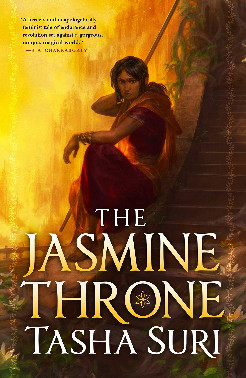In the court of the imperial mahal, the pyre was being built.
The fragrance of the gardens drifted in through the high windows- sweet roses, and even sweeter imperial needle-flower, pale and fragile, growing in such thick profusion that it poured in through the lattice, its white petals unfurled against the sandstone walls. The priests flung petals on the pyre, murmuring prayers as the servants carried in wood and arranged it carefully, applying camphor and ghee, scattering drops of perfumed oil.
On his throne, Emperor Chandra murmured along with his priests. In his hands, he held a string of prayer stones, each an acorn seeded with a mother of flame: Divyanshi, Ahamara, Nanvishi, Suhana, Meenakshi. As he recited, his courtiers- the kings of Parijatdvipa's city-states, their princely sons, their bravest warriors- recited along with him. Only the king of Alor and his brood of nameless sons where notably, pointedly, silent.
Emperor Chandra's sister was brought into the court.
Her ladies in waiting stood on either side of her. To her left, a nameless prince of Alor, commonly only referred to as Alori; to her right, a high-blooded lady, Narina, daughter of a notable mathematician from Srugna and a highborn Parijati mother. The ladies-in-waiting wore red, bloody and bridal. In their hair, they wore crowns of kindling, bound with thread to mimic stars. As they entered the room, the watching men bowed, pressing their faces to the floor, their palms flat on the marble. The women had been dressed with reverence, marked with blessed water, prayed over for a day and a night until dawn had touched the sky. They were as holy as women could be.
Chandra did not bow his head. He watched his sister.
She wore no crown. Her hair was loose- tangled, trailing across her shoulders. He had sent maids to prepare her, but she had denied them all, gnashing her teeth and weeping. He had sent her a sari of crimson, embroidered in the finest Dwarali gold, scented with needle-flower and perfume. She had refused it, choosing instead to wear the palest mourning white. He had ordered the cooks to lace her food with opium, but she had refused to eat. She had not been blessed, She stood in the court, her head unadorned and her hair wild, like a living curse.
His sister was a fool and a petulant child. They would not be here, he reminded himself, if she had not proven herself thoroughly unwomanly. If she had not tried to ruin it all.
The head priest kissed the nameless princess upon the forehead. He did the same to Lady Narina. When he reached for Chandra's sister, she flinched, turning her cheek.
The priest stepped back. His gaze- and his voice -was tranquil.
"You may rise," he said. "Rise, and become mothers of flame."
His sister took her ladies' hands. She clasped them tight. They stood, the three of them, for a long moment, simply holding one another. Then his sister released them.
The ladies walked to the pyre and rose to its zenith. They kneeled.
His sister remained where she was. She stood with her head raised. A breeze blew needle-flower into her hair- white upon the deepest black.
"Princess Malini," said the head priest. "You may rise."
She shook her head wordlessly.
Rise, Chandra thought. I have been more merciful than you deserved, and we both know it.
Rise, sister.
